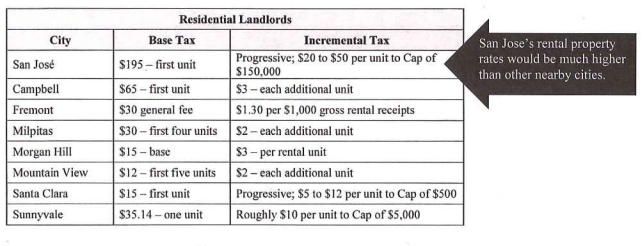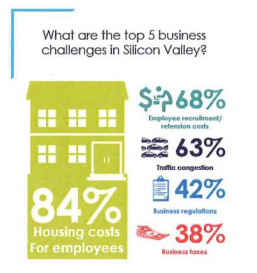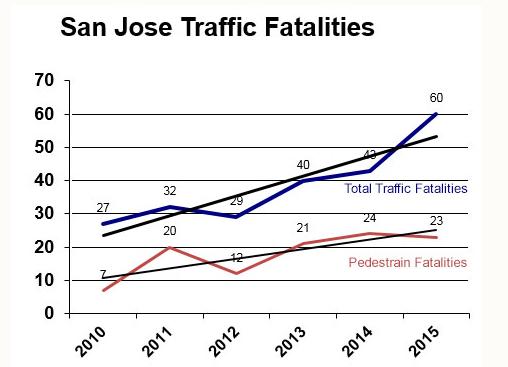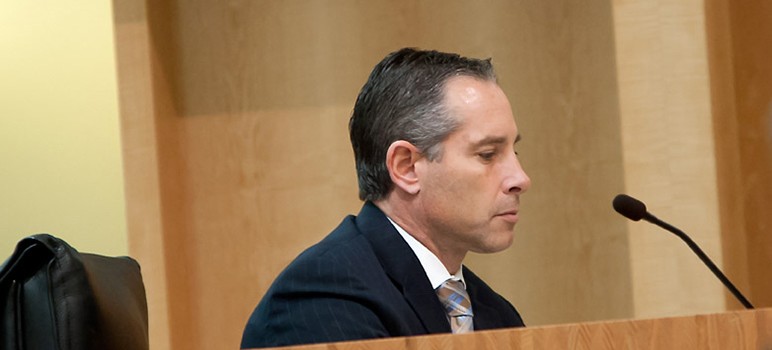UPDATE: Scott Myers-Lipton said he supports combining the mayor’s compromise with Councilman Rocha’s proposal. Below is his statement in full.
Dear Mayor and City Council,
I am writing in support of Mayor Liccardo's and Council member Rocha's memos that recommend to the City Council to put the "alternative model" on the ballot. In my previous letter of June 20th to the City Council, I argued that the staff's proposal needed to adjust the rates for the business tax, as they fell heavily on rental properties. The alternative model accomplishes this by decreasing the residential rental tax rate by one-half, increasing the business tax rate by $5 per employee, and increasing the assessment of commercial property to $0.025 per square foot rate.
I want to thank Mayor Sam Liccardo, Budget Director Lee Wilcox, and Council member Don Rocha for their work on coming to a positive resolution. Unfortunately, I will be unable to attend this Tuesday’s City Council meeting as I am currently out of the state, but I wanted to inform you that I am in support of the alternative model.
Kindly,
Dr. Scott Myers-Lipton
When San Jose State professor Scott Myers-Lipton pitched the idea of upping the city’s business tax for the first time in decades, he suggested linking the ballot measure to annual gross receipts. Worried that the initiative would scare away business, Mayor Sam Liccardo made a counter-offer to eschew the gross-receipts tax but double yearly business license revenue from $12.7 million to $25.4 million.
The hitch in Liccardo’s compromise—which comes up for discussion at the first City Council meeting of the new fiscal year—is that it shunted the burden from mobile tech firms to residential landlords. To Councilman Don Rocha, that’s a problem.
The proportion of licensing taxes paid by residential landlords would go from 7 percent of city revenue to 16 percent under the mayor’s plan, while the share borne by businesses that pay per employee would actually decrease.
“My concern is that I still don't think that it's equitable to place such a large proportion of the burden on just one sector of our business community,” Rocha wrote in a memo urging colleagues to adjust the initiative before voting to place it on the Nov. 8 ballot. “There's a legitimate question as to what equity means in this case: how should we apportion the tax between residential landlords, commercial landlords, and employers? In my opinion, the fairest approach would be to try to match the proportion of the tax borne by each sector to the relative size of each sector within our economy.”
The below chart shows how San Jose’s current rates stack up to those proposed by Mayor Liccardo and Councilman Rocha.

Source: City of San Jose
In the last council meeting before the July recess, Liccardo directed city staff to compare how San Jose’s tax on rental properties compare to surrounding cities. That research, Rocha noted, found that San Jose’s proposed rental property tax would be far higher than any South Bay jurisdictions.

Source: City of San Jose
City staffers justified the disparity by saying that residential rentals are a “more significant business” in San Jose than nearby communities, and that rentals consume more services.
Rocha questioned the logic of that argument, saying the city presented no data to back up the claim that residential rentals comprise 16 percent of the local economy.
“If staff has data that supports the idea that residential rentals are that significant, then they should absolutely provide it to the council, but in the absence of such data I think we need to adjust the rates to a more reasonable level,” he wrote.

Source: Silicon Valley Leadership Group
Rocha also took issue with the city’s claim that rental housing sucks up more public services than other businesses. To purport as much oversimplifies the complex symbiosis between jobs and housing, he said.
“It has become fashionable within City Hall over the past decade to try to enforce a rigid fiscal distinction between jobs and housing, but the real world is nowhere near as simple,” Rocha said. “Jobs and housing depend on one another, and cannot be so easily pulled apart.”
Another factor to consider is public sentiment. Polling conducted earlier this year showed that likely voters overwhelmingly supported upping the business tax for larger businesses. But fewer than half supported the idea of a tax increase on landlords.

Source: City of San Jose
San Jose voters will decide the fate of the proposed business tax increase along with a regional transportation tax, a $950 million housing bond measure and an initiative that would require employers to offer additional hours to part-time workers before hiring on new staff.
More from the San Jose City Council agenda for August 2, 2016:
- Yet another measure on the Nov. 8 ballot would put an end to San Jose’s pension wars. The city released the final language of the initiative that would replace Measure B, which voters approved in 2012 in an effort to rein in runaway public pension costs. The replacement measure hammered out by City Hall and its labor unions last year will save taxpayers $3 billion over the next three decades, according to the mayor’s office.
- San Jose will open up bids for $8.1 million in upgrades to beef up security at the city’s notoriously porous Mineta San Jose International Airport.
- The city will renew a commitment to Vision Zero, a global campaign to reduce the number of traffic fatalities. San Jose has long reported high numbers of traffic deaths, including pedestrian fatalities, and those numbers appear to have only increased in recent years. In 2015, 60 people died in traffic collisions, putting traffic fatalities well over the city’s homicide rate.

Source: San Jose Police Department
WHAT: City Council meets
WHEN: 1:30pm Tuesday
WHERE: City Hall, 200 E. Santa Clara St., San Jose
INFO: City Clerk, 408.535.1260


Retirement benefits for public safety personnel, as outlined above, are nothing more than a band-aid over a festering wound, promoting the illusion of progress while changing nothing for the better.
Police and Fire Associations will get no improvement to retirement benefits without voter approval? Retirement benefit negotiations have been changed from “meet and confer” to “political circus”. What a shame.
I seriously doubt that any experienced cop will come to SJPD and new hires will go through the Academy, at City expense, work for a year until they receive their Basic POST certificate, then leave for an agency that offers far better pay and benefits, which won’t be hard to find.
The one chance the City had to fix the public safety retirement staffing crisis an attracting new recruits and experienced officers would have been to completely and unconditionally repeal Measure B.
There would also need to be a ballot measure that requires the City to “meet and confer” with labor associations and settle contract issues by binding arbitration unless directed to do otherwise by voter approval.
San Jose, the crime capitol of Silicon Valley. Good luck. Public safety services have hit an iceberg and all the mayor and council are doing is rearranging the deck chairs.
Let’s raise money by creating a betting pool to guess how low police and fire staffing will go, how much response times will increase, and how much the rates of major crimes will rise. Let the city raise money that way, it’s at least as good an idea as what seems to be floating out there now.
So very true. Public safety in san jose has not yet hit bottom. The citizens continue to bury their heads in the sand. If all is fine in Almaden Valley then nothing to worry about (thats the current guage of safety). Staffing is beyond critical at this point. Mandatory overtime staffing was implemented and guess what? Patrol has 1300 vacancies from not until December that must be filled by overtime. Good job Mr Mayor and Council you should be very proud of yourselves. And tonight Tuesday (National Night out) Command staff will send officers out to various touchy feel good meetings where neighbors will voice face to face with officers to complain about speeders on thier street, the motorhomes parked nearby with KOA campers, barking dogs and why officers dont come when they call for the kids drinking in the park. When cops explain the staffing crisis the citizen will look with a bewildered gaze as though they had just returned from Gilligans Island where there are no newspapers or TV. The SJPD is forever changed. Good luck with that
> then leave for an agency that offers far better pay and benefits, which won’t be hard to find.
I have no idea whether this is true or not. But IF it is true, it’s an assertion that San Jose is NOT paying MARKET RATE pay and benefits.
If San Jose chooses NOT to pay MARKET RATE pay and benefits, there are only TWO ways to achieve full staffing:
A.) slavery, or
B.) market rate pay and benefits.
Whether or not San Jose is offering market rate pay and benefits is NOT determined by the agreement of a city staffing bureaucrat with a union negotiating bureaucrat.
It is determined when a sufficient number of qualified applicants VOLUNTARILY apply for jobs.
agreed
Mr. SJOT Bubble,
Your economics analogy is sound. It just doesn’t apply. Public safety is not a business. Cops and crooks are not assembly line workers. Crime is not a product.
Crime is more analogous to a disease. Cops are like antibodies. Crime infects a community. If allowed to go unchecked because there are not enough “antibodies” to eliminate it, control it, or keep it from spreading then the quality of life of the “host” community will suffer and possibly, in a sense, die (become unbearable)
If an infection is caught early enough and antibodies attack it vigorously enough, they will be much more successful in curing it (reducing the crime rate) than if the infection is allowed to fester to the point that it grows and spreads to the point that even the strongest antibodies, too few in number now, (nearly all of the most experienced cops/antibodies have left SJPD) can only delay the inevitable death, in the case of crime here, death might be considered to be the community’s sense of safety,security and its quality of life. No matter how much you pay to buy medication (or wages to hire cops), once the infection (crime) spreads out of control, it may be too late to prevent the community “scarring” and/or lingering (unbearable crime rate) death (out of control crime rate).
People such as yourself (and I consider you an intelligent individual) may be unaware and politicians, driven by self-interest are likely too apathetic to care, that the disease may still be undetected and it may be too late to stop or control it once its presence is finally discovered. Consider crime statistics a mere spot on the x-ray for now but an experienced “doctor” (The SJPOA) knows what is happening but his diagnosis and prognosis has been ignored.
As to the “slavery” portion of your argument, consider this. If a person agrees to work a certain number of hours, for a lower wage (lower than similar workers doing the same job; but not really “sweat shop” wages, let’s be serious) and they have no real bargaining power (unless the persons benefiting from keeping wages low agree to increase them (politicians duping the low-information voters), then we have a situation that might be considered “wage slavery”.
If a person agrees to work a set number of hours but is told, “No, you will work the number of hours you are told to work and you are not free to choose which, or how many, that those hours will be, as is the case with the forced/mandatory overtime cops are now required to work due to the lack of staffing resulting from the destruction of fair wages and benefits, this tends to support the “wage slavery” argument, does it not?
J.S. B.
If your point is that their is no effective relationship between performance and pay for public safety officers, then lets pay them less for the same result.
We can use the money we save to stop global warming or make San Jose a better sanctuary city.
Mr. SJOT Bubble,
Your response is beneath your usual insight.
My point was that if you pay officers less, you will end up with fewer officers who will have lesser levels of experience who, after gaining experience, will subsequently leave for agencies that offer better compensation, which officers equate to better community support, and this exodus/turnover results in an increase in crime, as we are now seeing develop.
It would take volumes to explain how officers consider pay and benefits as a reflection of community support, appreciation and respect. These latter factors result in higher morale which leads to more proactive enforcement which results in more police pressure on criminals which results in less crime.
What does an ounce of morale cost? Where do I buy it? It’s not a commodity. That is my point. This may be beyond the understanding of an economist or an accountant. I thought you were better than that.
Where can I buy a leader?
> This may be beyond the understanding of an economist or an accountant. I thought you were better than that.
No. Sadly, I’m worse than an economist of an accountant. Just a wasted, washed up abused taxpayer.
Your argument seems to boil down to the claim that police officers have some sort of special “pixie dust” that employers need to acknowledge and pay extra for, even though no one can explain what it is or quantify it.
No two individuals are alike, and it is almost always true that person A will have stronger skills than person B in some area, but person B will excel in other areas. We are accustomed to the idea of making trade-offs.
Nonetheless, it is a BEDROCK presumption of our society and our free market economy that NO ONE IS INDISPENSIBLE.
Everyone is replaceable. Even the President of the United States.
I think you’re looking at the issue from a monopoly supplier’s perspective: “I have X, I’m the only one who has X, and you must pay whatever I ask for X.”
I’m hopeful that we are still enough of a free market civilization that we can apply free market principles:
“I need X. I have Y amount to spend. What’s the best/most X I can get for Y?
“I can’t afford the model with the deluxe, industrial strength pixie dust. How about a couple of the lighter duty models with less pixie dust?”
I will presume that you are capable of handling a little political incorrectness, so I will remind you of the wisdom of the one time chief of the Soviet Navy, Admiral Gorshkov:
“Better is the enemy of good enough”.
Not the typical Silicon Valley rah-rah speech, but a recognition of the reality of warfare and economic competition.
It would be NICE to have the BEST cops, the BEST firemen, the BEST social workers, the BEST whatever. But we can’t. Resources are ALWAYS limited.
Instead, we do the best we can to get the most bang for the buck.
Ever notice Don sort of looks like Sad Keanu in this picture?
http://cookiesbecrumbling.com/img/cookies12.jpg
The bottom has not been reached…that is true. But wait for it…..when BART is complete, and there are no improvements to police or fire (hiring more people), you will see San Jose shoot past the bottom so fast it will leave a vapor trail. Be ready San Jose (I’m talking to you, Willow Glen and Almaden Valley), the criminal element outside of your wonderful City knows you are fat and rich, and woefully unprepared.
Why are there no taxes paid by mobile home park owners? It’s at 0% in all three areas? Just curious…
> San Jose City Council to Start New Fiscal Year, Look at Biz Tax and Pension Reform Measures
By the way,for anyone on the City Council interested in being the next mayor, that’s opportunity knocking.
Sam Liccardo was elected in a squeaker election against Dave Cortese.
Republican, Libertarian, and many independent voters undoubtedly just flipped a coin.
But, things have changed.
Liccardo has shown himself to be a Hillary Clinton toe sucker. When Bernie recently endorsed Hillary, he wasn’t happy or cheerful. And Bernie voters are even more hacked at the Hillarians.
And Trump voters? WHOA!!!!
Sam LIccardo is RADIOACTIVE!
Trump voters are probably already lining up at the polling stations to vote against smilin’ Sam.
And, undoubtedly, there are SJPD voters still eager to push through the mob of #BernVictims and #Trumpsters to get a whack at Sam.
One Term Sam!
Bubble…. so true that Sam will probably be one term. The issue though is who will run? We need an overhaul! Who will step up? You? JMO? Smokey?
I’m deadly serious. Who can we get to run for Mayor of San Jose that can hold back the reach of SVLG, Greenbelt.org, SPUR, The bicycle coalition, SV@Home, and all the other non-profits and groups set out on an agenda that is making crazy here!
All these groups mean well, but they have not studied carefully how their “policy suggestions” have hurt San Jose in so many ways.
Will you run?
The SJ City Council needs to address the issue of commercial marijuana cultivation, which is likely to be the next big growth opportunity in California, for the next several years.
At present, San Jose has NO policy, with respect to this important matter.
San Jose needs to stop kicking the can down the road in hopes that the marijuana legalization movement simply disappears, lest the City find itself caught flat-footed yet again, by impatient entrepreneurs who are likely to interpret the lack of regulation as tacit approval.
Compare the situation in Santa Clara County and San Jose, to that of San Francisco, and other counties: http://www.sfchronicle.com/business/article/Warehouse-or-grow-house-Neighbors-can-t-tell-9137999.php?t=eb03fe5dd0#photo-10738564
> The SJ City Council needs to address the issue of commercial marijuana cultivation, which is likely to be the next big growth opportunity in California, for the next several years.
A very successful businessman recently made this point to me: “WHEN [not if] the state marijuana initiative passes, the market for warehouses and industrial spaces will take off like a rocket.”
When I asked why, since marijuana can be grown outdoors — e.g., illegally in Almaden Quicksilver Park — he quoted back to me one of my very own iron laws of capitalism: agriculture requires private property to grow crops, and crops require watchmen and police forces to guard against foragers, i.e. poachers.
I think there are HUGE, HUGE consequences to California’s economy and society if the state marijuana initiative passes.
ONE of the big consequences is that warehouse and industrial rents will increase dramatically, AND — since there is linkage between industrial and residential property markets, home prices and RENTS will ALSO be goosed skyward.
If renters think rents are high now, just wait until the marijuana tycoons start turning “low income housing” units into urban hot houses for pot growing.
Enjoy your legal marijuana in your homeless camp, San Jose.
By the way, if there are any political denizens out there who know how to track political contributions, it would be interesting to know how much money big real estate interests are putting into the state marijuana ballot measure.